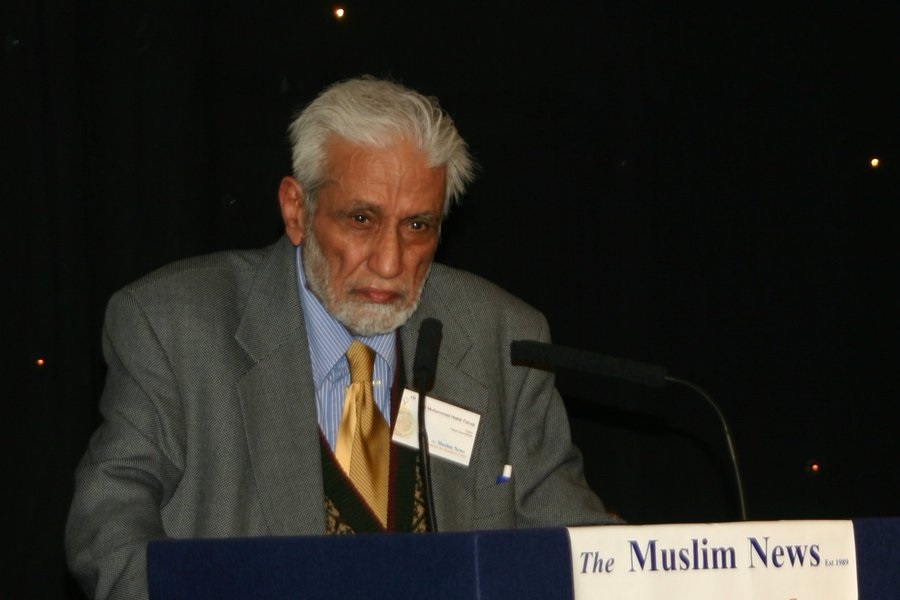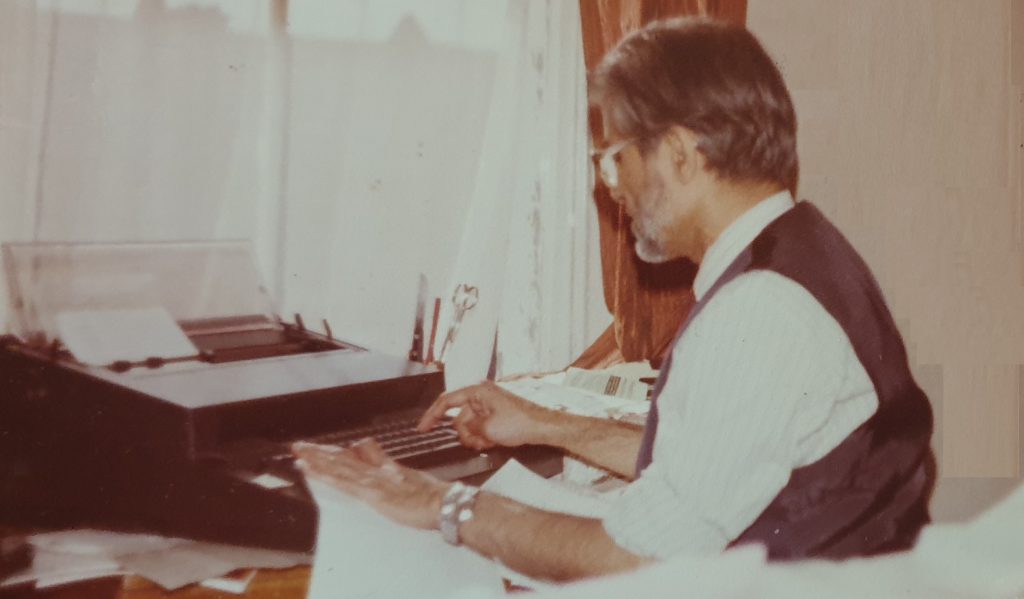
By M Ghazali Khan
Legendary journalist, intellectual, pioneer of Muslim journalism in the West and editor of Impact International Muhammad Hashir Faruqi died peacefully on 11 January at his home in London.
Mr Faruqi was born on 4 January 1930 Ghazipur city of north Indian state Uttar Pradesh. As a student, he participated in the movement for the creation of Pakistan. He served as the secretary of the Muslim Students Union at Kanpur Agriculture College, from where he passed B.Sc. in Entomology. After migrating to Pakistan, he served in senior positions at the Department of Agriculture. In 1960, Mr Faruqi came to Britain to pursue PhD at Imperial College, London.
Since his student days, he had a passion for research and writing and fulfilled his creative urge by contributing to various publications. Although he had been planning to bring out a magazine since the sixties, as he described in one of his articles, political upheavals in the Muslim world in the seventies forced him to take a huge turn and change his career, and, therefore, he launched the fortnightly Impact International that later became a monthly with himself as the editor, scholar and writer Abdul Wahid Hamid as associate editor and Mr Saleem Siddiqui as Manager, who remained with Impact until it ceased to publish in 2013.
Mr Faruqi had made serving Islam and the ummah his mission, for which he used journalism as a tool. To say that his devotion and commitment had made Impact International the only magazine of its kind, especially during the seventies and eighties, in the whole of the Muslim world is no exaggeration. Some of the international figures he interviewed for the magazine included late King Faisal of Saudi Arabia, spiritual leader of Iran late Ayatollah Khomeini, President of Pakistan late Gen Ziaul Haq, Palestinian leader late Yasar Arafat, president of Indonesia late Suharto and the former Prime Minister of Malaysia Mahathir Mohammad.
Non-Western, especially Muslim, countries have always been unhappy about the bias of Western news agencies on their coverage of them. Still, for information, they have always relied on these very organisations. Even in this social media age, the situation has not changed much. But what made Impact International in those pre-internet days a unique magazine was the fact that its editor had developed a network of volunteers from around the world—including Muslim regions under USSR, communist regimes in eastern Europe, sheikhdoms in the Middle East and dictatorships in Africa and Asia. They risked their safety and regularly updated Mr Faruqi through the postal system about political developments in their respective countries. Based upon the rare information provided by them, Mr Faruqi’s writeups and analyses were read with keen interest in intellectual circles and by individuals, writers and commentators and were referenced in serious magazines and books.
Mr Faruqi had maintained an extraordinarily extensive and systematic archive in Impact‘s office. Before starting to write, he used to consult those meticulously organised files in his archive containing clips from newspapers, magazines, news agencies’ reports, BBC’s SWB (Summary of World Broadcasts), and his volunteers’ information.
Mr Faruqi had no association with any group or organisation. Nevertheless, his admiration for Maulana Moudoodi had brought him ideologically closer to Jama’t-e-Islami. Contrary to the rumours spread by his critics, he received no financial help from any government. His principles, self-respect, and determination to not compromise his independence did not let him extend his hands for help before anyone. Impact faced severe financial hardships, yet he refused to accept even lucrative offers. He had contacts with powerful and resourceful people and had he acquiesced to compromise on his principles, he would not have spent all his life and died in a small, rented flat in Kilburn.

Here we have an example of Mr Faruqi’s sense of self-respect. He was a good friend of Saudi businessman late Mr Salahuddin. Before starting Arabia the Islamic World Review, Mr Salahuddin asked Mr Faruqi to stop Impact and accept Arabia’s editorship. His offer was too attractive to be rejected by anyone facing financial crisis who, after publishing one issue, was unsure if he would be able to bring out the next one. Yet Mr Faruqi declined to honour his friend’s offer.
Allah SWT had blessed him with knowledge, unique skills, sharp intellect, vision, dedication, commitment and humility. He often used to quote late Pakistani scholar Zafar Ishaq Ansari (or his father Zafar Ahmad Ansari, I cannot recall correctly) as having said that if one did not care about the credit from humans, he would be able to perform tasks more than his abilities.
Mr Faruqi played active and leading roles in establishing the UK Islamic Mission, Islamic Foundation, Muslim Educational Trust, Muslim Aid and Muslim Council of Britain (MCB) but never accepted or even tried to get any post in any of these institutions. As far as MCB is concerned, it was purely his brainchild. This reminds me of an incident when, upon Mr Faruqi’s advice, I applied for a job with MCB. A leading figure interviewed me. One of the questions asked was the standard one regarding what I knew about the organisation. To this, I replied, ‘When MCB was born, I happened to be in the delivery room.’ As can be expected my response was not appreciated.
Mr Faruqi’s love and devotion to his mission and his self-denial when it came to the interests of the ummah could be judged from an incident his close associate Mr Saleem Siddiqui, former Mayor of London Borough of Hackney describes. According to him: ‘In 1966 Egyptian government, through its court, had awarded death sentence to Sayyid Qutb. Leading Muslim migrants and students from various countries had gathered at the head office of the UK Islamic Mission to chalk out a strategy to pressurise the Egyptian government to stop his hanging. During the meeting, a phone call came for Mr Faruqi. He went to attend the call and, as I was standing near him, I overheard him recite Inna Lillahi wa inna ilaihi rajioon and give some instructions to the caller. We saw clear signs of sorrow on his face but without uttering a word about what had happened, he went back to his seat and participated in the meeting as usual. It was after the meeting that we found out that the call was from one of his friends who worked at the London branch of Pakistan National Bank who had received a telex message from Mr Faruqi’s younger brother about the death of his father.’ Quite an epitome of patience and self-composure.
As far as he was concerned, taking credit for any of his works was a sin to him. He resented showing off to the extent of extreme disgust. He never took credit for anything but extended it to others for what he himself had done. At times, because of this, he had to face disappointments, too, but never expressed his anguish to anyone. Perhaps it was this experience of him that made him give me a piece of advice on a particular occasion: ‘Don’t try to drive from the backseat.’ But this advice was to his juniors.
This reminds me of another incident. In 2013, my friend Ahmad Versi, editor of Muslim News, wanted to honour Mr Faruqi by giving him Editor’s Lifetime Achievement award at Muslim News’ annual award ceremony. Knowing his nature, he was unsure how to approach him and persuade him to accept the award. He wanted my help in this regard. We both knew that he had already declined to accept such a request from a big organisation. So, I suggested to him to approach Mr Faruqi directly and say to him that he wanted the younger generation to know about his work and accomplishments to learn from. The trick worked. Typical of him, in his speech at the award Mr Faruqi said to the audience, ‘Although I am accepting it, this belongs to all of you here.’
Paying tribute to Mr Faruqi in the ceremony Ahmed Versi said: ‘For me, he was an inspiration to establish the Muslim News, and was a true pioneer for his unflinching journalism. To others, he was an innovator in the British Muslim community, being an intellectual lynchpin for many of our struggles as a burgeoning community. And for his readers, he is our connection from the world we inhabit to now to a Muslim world that began its uncertain journey in the midst of decolonization, war and new modern identities…’
I joined Impact as a trainee in 1983 and worked under Mr Faruqi until 1992. Even after my leaving Impact, he continued to guide and advise me on personal and social issues. For the last four days, the film of old memories has been playing in my mind. His attitude towards me was of an affectionate mentor. His favours on me are numerous. He hated to mention or be reminded of any favour done to anyone and strictly followed this Qur’anic injunction: ‘Believers! Do not nullify your acts of charity by stressing your benevolence and causing hurt as does he who spends his wealth only to be seen by people and does not believe in Allah and the Last Day. The example of his spending is that of a rock with a thin coating of earth upon it: when a heavy rain smites it, the earth is washed away, leaving the rock bare; such people derive no gain from their acts of charity. Allah does not set the deniers of the Truth on the Right Way.’ (Qur’an, 2:264)
How many noble qualities shall I narrate of my teacher, mentor, and benefactor? I conclude this article by copying, from memory, what he had written in the obituary of late Muhammad Muslim Saheb, editor or Urdu daily Dawat, with whom he shared many common qualities including gentleness, commitment, determination, humility and the love of Islam and the ummah and about whom he had written: ‘He never expected any credit from anyone. He was collecting his credit from Allah.’

🌷Masha Allah, so powerful note
Thanks Ghazali sahib for an excellent article on Faruqi sahib.
Masha Allah, very good write up. I never met Faruqi sahab but learned a lot from his writings- Inna lillahi wa inna ilehe rajeoun
Beautiful writing , really enjoy reading it.
Jazakallah for sharing it Gazali Saab
Masha Allah, what a beautiful soul, may Allah accept all his efforts and grant him jannatul firdous
We all grew up reading Impact International, the A-4 size tiny journal printed on onion paper. Its comments were crisp, piercing and impactful. Some of the stories it published brought a fund of new information. I dont need what was the source of funding for this magazine.
I had a chance to interact with him twice, first in Riyadh, during a WAMY conference in February 1986. It was very brief.
Second, while returning from a study trip in US I stayed in London for 8-9 days in August 1993 and visited his office twice or thrice. His archives was impressive. He was humble, down to earth and humorous. He even invited me home for dinner one evening. I had chance to see Mr. Yusuf Islam too in his office. He was very concerned about Muslims in India after demolition of Babri Masjid (1992) and took a lot of notes on emerging coalition of SP-BSP in Uttar Pradesh.
I sincerely pray Allah to elevate his station in the paradise. Such people are rare. I wonder if Hashir Faruqi was his real name. Someone can enlighten me from among his acquaintance. Maqbool A. Siraj, Bangalore, India
Yes Muhammad Hashir Faruqi was his real name.